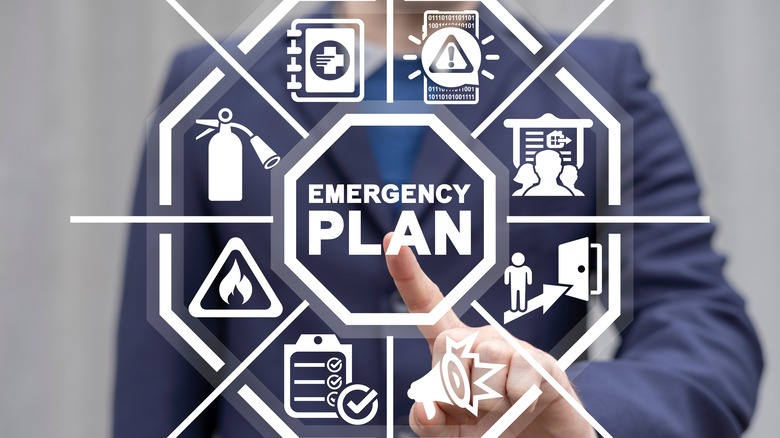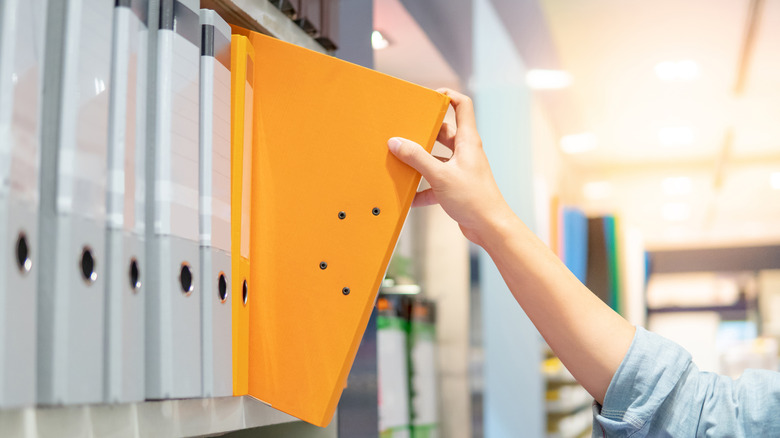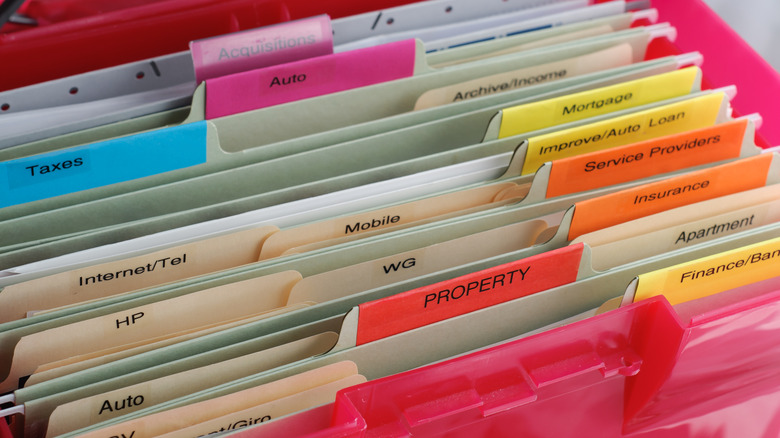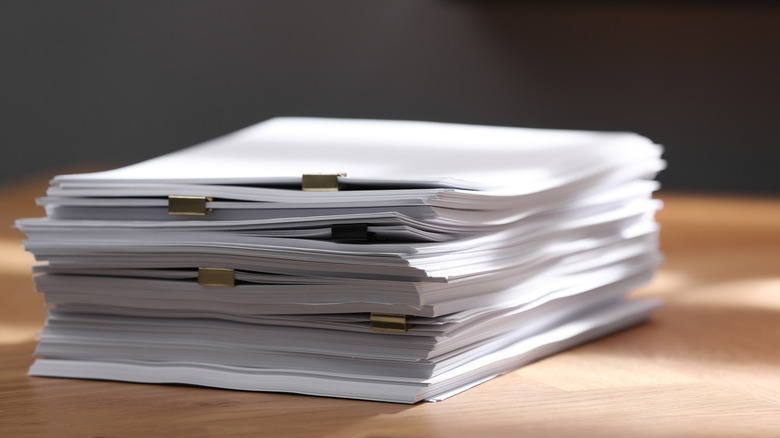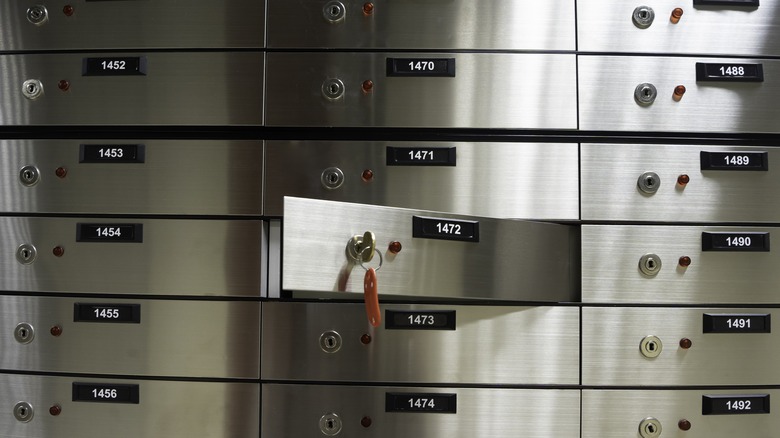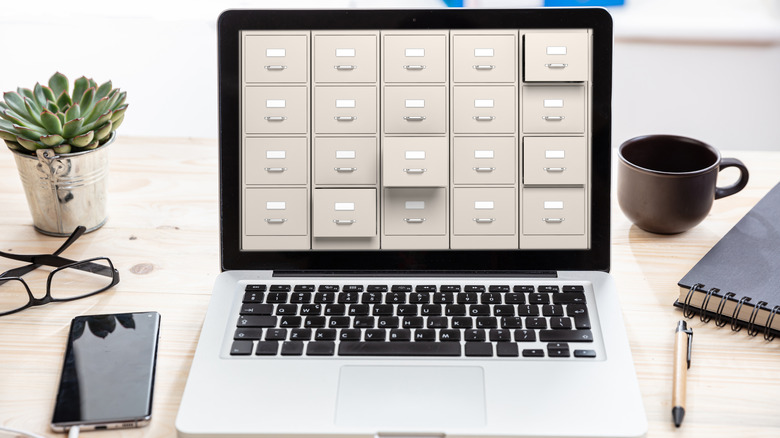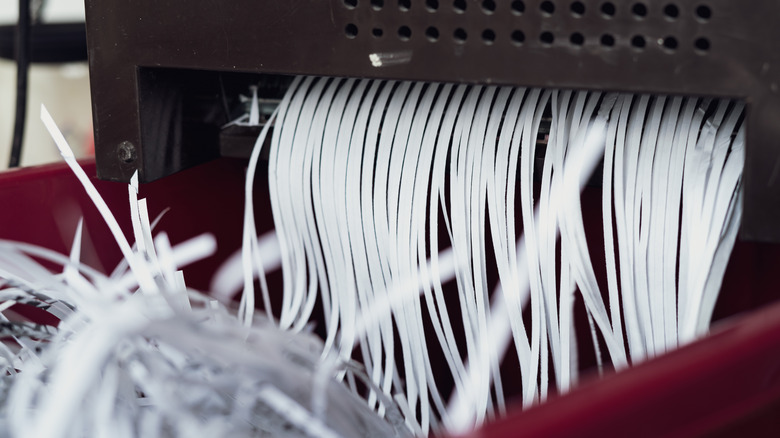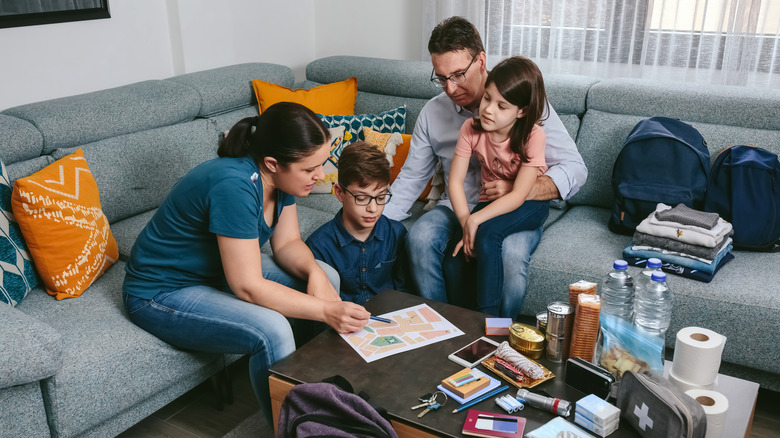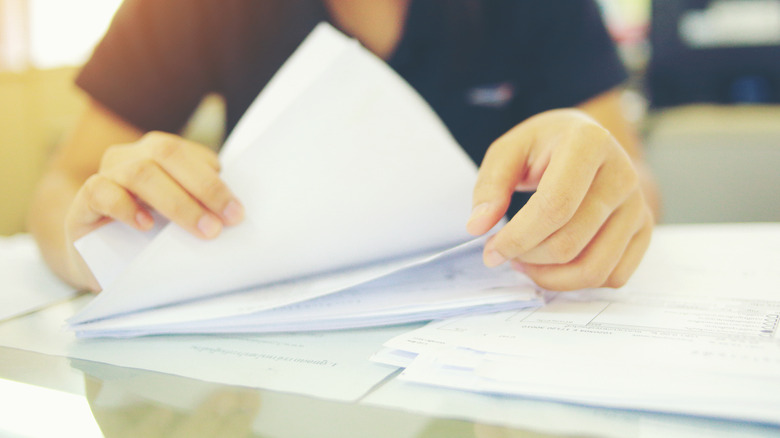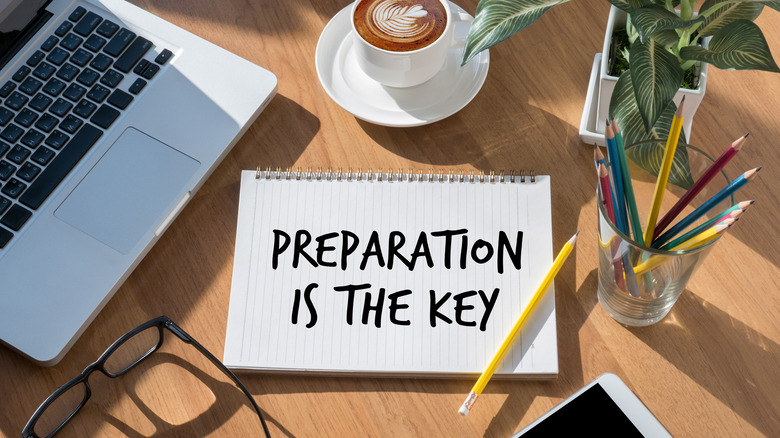How To Organize Important Documents In Case Of An Emergency
Emergencies happen when we least expect them. That's why they're called emergencies. You truly never know when something will happen that could threaten you or your family. And with September being National Preparedness Month, now is an excellent time to ensure you have a plan in place. While most people will create emergency kits and go bags, something they often skip is paperwork. Believe it or not, having your most important documents ready for an emergency is a crucial step.
According to Ready.gov, this year's theme for National Preparedness Month is "A Lasting Legacy." With it, they plan to teach you how to protect the life you've built. That includes your home, your business, and your history. That's where documentation comes into play and preparing these papers for an emergency will help you in the long run. Let's take a look at some ways you can begin to make a plan for those all-important documents. And for extra tips, make sure to check out this video on Youtube to learn more about what Ready.gov is planning for the month of September as they'll share more ways you can get fully prepared for any sort of emergency.
Pick a central place to store everything
If you want to best prepare yourself for an emergency, you must first figure out where you will keep all of your documents. Having them scattered all over your house is not going to help if you have minutes or even seconds to evacuate. So before you even worry about what paperwork you need and how to organize it, let's first pick a central location to store it. The room you pick can really be anyone that best suits your needs. You can choose your master bedroom, a home office, or a closet. So long as it gives you plenty of space to work with, anywhere will do.
Why is this such an important first step? Because as Done & Done Home says, organizing like with like is a basic foundation in the organizing field. Logistically, it makes the most sense because when you keep all your paperwork in one location you won't be searching through random drawers or countertops. You'll know that if it's paper, it goes in this one spot. How you choose to organize your important documents will be up to you and we'll share some tips in a moment. But your main focus right now is to pick a central place where you're going to keep all of your paperwork. Especially those important documents.
Buy the necessary supplies
After you've selected where you're going to keep your paperwork, the next step is choosing how you're going to store it. This will require you to go out and buy some supplies. But before you do, talk it over with your family and figure out the best way to keep it all together. For example, you might choose to buy a single filing cabinet. Or you might opt for a binder or two. Then you'll need to decide if you need a label maker or if you'll write the category names yourself. How about folders? Do you have enough or do you need more? If you're going the binder route, you might need to buy protective sheets.
What you choose to organize your paperwork in is in your hands. A filing cabinet is bulky but can hold a lot. A binder, though smaller, can easily be stored on a bookshelf or tucked away in a closet. Set Things Straight believes a binder is better for general organization. It's also best for those who have minimal documents to store. But if you have a lot more paperwork to organize, a filing cabinet is your better bet. In the end, you need to take into account a few things: the space you have, how much paperwork, and what is best suited for your needs.
Categorize your documents
Do you have a filing cabinet or fresh binder or two ready to go? If so, you can start the next step which is to categorize your documents. This is using the like-with-like concept we talked about before. Take some time and separate all your important papers into categories. Don't worry too much about the names of the piles. Just try and keep all similar documents together. You might have a stack of insurance papers, another one with all your birth and death certificates, and one that includes warranties or manuals.
What you're going to call these groups isn't important yet. This step merely helps you determine exactly how many categories you're going to have. According to Indeed, separating your documents by category helps you find what you're looking for faster. And if you find that some have sub-categories, make a note of that. Because before you get to organizing and labeling, you want to first create a list of all the categories you have. So once you're done separating everything into like piles, write down the names on either a single piece of paper or on sticky notes and place them with the correct stack.
Declutter before organizing
Now that you have different stacks of similar paperwork, the next step is to declutter them. You might have already started doing this when you were separating them and that's fine. Perhaps you came across a warranty for something you don't have anymore. Or you noticed an outdated insurance policy. When you see a document that is no longer relevant, it's time to recycle or shred it. Taking the time to declutter your papers before organizing them is a vital part of the preparedness process. This allows you to keep only what you need and not hang onto stuff that won't matter in the long run.
It might surprise you to learn that as reported by Minimize My Mess, we don't look at 80% of the paper we keep. That's why decluttering is helpful. Especially your important documents. The last thing you want is to have to grab a ton of binders or folders full of papers that may not be as vital as you think. So as you begin to sort through your piles, ask yourself if the document you're looking at is up to date. Does it have information that you need to refer to constantly like passwords or bank routing numbers? Does it contain a policy that you need to show during tax season? This step will take you the longest because you really want to make sure that the paperwork you're keeping is the most recent and necessary.
Keep original copies secure
It doesn't matter how often you declutter your paperwork. There are certain documents we all need to keep for as long as we live. And according to most government requirements, you need to ensure you have the original copies of certain things. For example, social security cards, birth and death certificates, licenses, and contracts are some papers that the originals must be saved and secure. You want to keep them in a place where they'll be protected from fire or water damage.
There are a few ways you can protect these types of documents in case of an emergency. One tip, according to Nolo, is to keep copies in your home, but store the originals in a safe deposit box at your local bank. If you don't want to do that then you can buy a fireproof box for your home to keep them in. Other methods include giving them to your attorney or storing them digitally, which we'll talk more about in a minute. Your goal when protecting original copies is to ensure you keep them somewhere that if you're unable to get to, they will still be safe.
Digitize for extra security
In this digital age, you have a lot of options for storing important documents online. This is another great way to protect copies of papers that you may not need to refer to quite often. And by storing them digitally, you'll be able to declutter way more paper than you thought. Yes, you still need to keep the original copies of certain things but once they're digitally uploaded, you can put them away in a safe deposit box and rest easy. There are a few ways you can store important documents online.
You can either use software designed specifically for storing and organizing paperwork. Or you can organize them yourself on your desktop in a folder labeled, "Important Documents." The New York Times reports that digitizing paperwork is easier than ever. Gone are the days when you need a dedicated scanner. Your smartphone can work just as well. Simply take a photo and upload it to your computer either through cloud-based software or email it to yourself. And to ensure these documents are protected always password-protect your folders. Just make sure you write that password down somewhere so you don't forget.
Update documents when necessary
While most of your important documents won't change year-to-year, there are some that will. That's why it's good practice to look through and update your emergency paperwork on a semi-regular schedule The items you'll most likely need to update include insurance policies, warranties for new appliances you buy, loans, tax documents, and more. Essentially, once you get an updated copy of something either in the mail or through your inbox, replace it immediately. This ensures you're emergency paperwork is up to date and you can recycle or shred the old to make room for the new.
Reviewing your documents is important because what you decide to keep in your emergency bundle will be different from others. While most of us will have the usual documents like birth and death certificates, insurance policies, and marriage licenses, you may include a bit more or less. Elliot Davis notes that outdated policies and paperwork can hurt you more than help. That's why they suggest checking the status of your documents at least once a quarter. All of us receive updated policies at different points of the year. So add a date every three months to sit down and look through your emergency papers. Update what you need to and leave the rest.
Shred outdated paperwork
We talked a lot about decluttering and removing outdated documents. So you might be asking, "What do I do with all that old paperwork?" Many documents that should be protected for emergencies often include sensitive information. Think about your social security card, for example. If the wrong person gets a hold of that they can get access to a ton of private and personal stuff. And it's not just your social security card you need to worry about. Keeping your credit card number stored online opens you up to a higher chance of a hacker getting that information as reported by Intuit.
Insurance policies tend to have your address and more on them. And your tax documents contain a ton of private information you'd rather keep from prying eyes. Time Shred offers a comprehensive list of papers you should and should never shred. The should list includes most of what we mentioned before but other documents include employment records, bank statements, driver's licenses, and more. Overall, it's always safe to shred anything that contains personal and private information as this will be the best way to protect yourself from falling victim to identity theft.
Let your family know
It's all well and good that you're taking the necessary steps to ensure your important documents are protected during an emergency. But once you have everything sorted, organized, and set in a central location, make sure to share it with your family. Don't keep the whereabouts to yourself as this will defeat the purpose of all the steps you already did. Because if the emergency happens when you're not home, at least another family member can grab what is necessary. This is why choosing how you store your documents is important. A filing cabinet will be a lot harder to move, but if you keep everything in a single folder, that's fine.
The Savvy Sparrow prefers keeping an emergency binder as this is easier to grab, update, and store. It's easy to organize using tabs and protective sheets and thick binders mean more room. Still, a filing cabinet is just as effective, but you should at least show your family which folders are the ones they should focus on. Label them in red, making them impossible to miss. Keep them in the front so they're easy to grab. Remember, it doesn't matter how or where you store those important documents. What matters most is that everyone knows where to find them and can quickly grab them in case of an emergency.
Schedule regular organizing days
Paperwork is something that builds over time. Without proper regulation, it can take over surface areas or cram up a drawer or box. That's why scheduling days to sit down and organize them is a good practice to start. Especially when it comes to your important documents. While the majority of the paper in your home will be recycled, the paper you need to keep should consistently be sorted and organized. According to Nesting With Grace, a great way to keep paper organized is to scan documents regularly.
This means looking through the piles of paper you've since collected from your last organizing day and deciding what to do with it. Are you going to recycle it? Does it need to be shredded? Should it be kept for a few months or is it something that needs to be added to your emergency bundle? Take what you learned earlier and apply those methods when you schedule days like this. Separate paperwork into like piles, sort through them one at a time, and decide where it should end up. This is vital for not only staying on top of paper clutter but to ensure the paperwork you're keeping is needed and necessary.
Apply this method elsewhere
Now that you have all of your important documents together and organized, it's time to celebrate. You have peace of mind knowing that if there is an emergency, your paperwork is ready to go. But don't think you need to stop there. The great thing about learning an organizing practice like this is how you can apply it to other areas of your life. As we mentioned earlier, emergencies happen when we least expect them so it's good to be somewhat prepared. If you felt getting your important documents in order made you want to create an emergency go bag or kit, use the same steps. Make a plan, pair like with like, and determine where you should keep it.
You can even use the steps here to organize other spots in your home that don't have anything to do with emergencies. If you've been itching to get your kitchen in order, follow the same method. Sort similar items together, declutter what isn't necessary, and organize in a way that makes sense to you. And accept that no home is perfectly organized. In fact, Set Things Straight believes that imperfection is at the heart of organization. This is because you're always going to learn new methods and tricks. So if your emergency bundle isn't exactly as you imagined it to be, know that you can improve it. All that matters is that you have a plan, and that's what National Preparedness Month is aiming to achieve.
